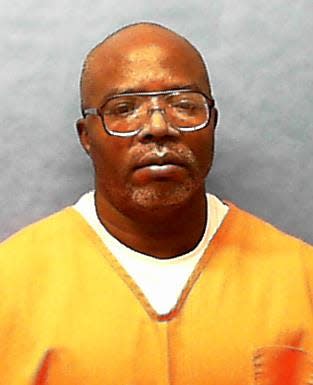Florida Supreme Court rejects appeal from Louis Gaskin to stop execution next week

The Florida Supreme Court on Thursday rejected an appeal from Louis Gaskin, the man known as the “ninja killer" who is scheduled to be executed next week. Gaskin’s attorneys will now appeal to the U.S. Supreme Court.
Gaskin was convicted in 1990 of two counts of first-degree murder in the killings of Robert and Georgette Sturmfels on Dec. 20, 1989, in Palm Coast's R Section. Gaskin shot them from outside the house and then broke in and shot them again. Gaskin then stole some items, some of which he gave to his girlfriend as Christmas presents.
Gaskin was also convicted of the attempted first-degree murder of Joseph Rector on the same night in the same section of Palm Coast.
Victim opposes execution: Noreen Rector, one of Gaskin's victims, opposes execution, has strong words for DeSantis
In his own words: With his execution looming, Louis Gaskin describes attack on second Palm Coast couple
'I shot him again': So-called 'ninja killer' describes how he murdered Palm Coast couple
A Flagler County jury also convicted Gaskin of two counts of armed robbery and two counts of burglary.
The jury recommended by an 8-4 vote that Gaskin be sentenced to death for the murders of the Sturmfels and a judge followed that recommendation.
The Florida Supreme Court issued a ruling Thursday rejecting 56-year-old Gaskin’s appeal and also denying his request for a stay of his planned execution by lethal injection at 6 p.m. on Wednesday, April 12.
Gaskin is represented by Eric Pinkard, Tracy M. Henry and Cortney L. Hackett at Capital Collateral Regional Counsel's office in Temple Terrace.
The state Supreme Court supported Circuit Judge Terence Perkins' denial of a hearing to present mental health expert testimony. The Supreme Court ruled that the issue had already been fully considered previously by the circuit court and the Supreme Court. The Supreme Court noted that previous rulings had held that Gaskin’s attorneys had made a strategic decision not to call mental health experts because his background contained “many negatives.”
The state Supreme Court also rejected arguments from Gaskin that his Constitutional rights were violated in part because the jury was not unanimous in its death recommendation. But the Supreme Court rejected the claim, saying it has repeatedly addressed the issue that a ruling known as Hurst was not retroactive to Gaskin’s case.
The state Supreme Court also rejected Gaskin’s attorneys' arguments that executing him after he has been on death row for more than 30 years, “most of that in what he deems as solitary confinement,” was cruel and unusual punishment. The court rejected both that a lengthy stay was cruel and unusual punishment as well as his characterization that it was solitary confinement.
The Supreme Court stated it rejected a similar argument in the case of convicted murderer Donald Dillbeck, who was executed in February.
The court also rejected an argument that an error in the jury instructions over the especially wicked, evil, atrocious or cruel aggravator contributed to the death sentence for the murder of Robert Sturmfels due to the “substantial aggravation in the case.”
The state Supreme Court also rejected Gaskin’s lawyers’ contention that his execution should be stayed because “more time was needed to resolve complex issues.” The court ruled that Gaskin had failed to raise substantial grounds for a stay.
The court denied Gaskin’s attorneys' request for oral arguments and stated it would not reconsider the issues.
Chief Justice Carlos G. Muniz, and Justices Charles T. Canady, John D. Couriel, Jamie R. Grosshans and Renatha Francis concurred while Jorge Labarga concurred in the result.
This article originally appeared on The Daytona Beach News-Journal: Louis Gaskin execution: State Supreme Court rejects his appeal
